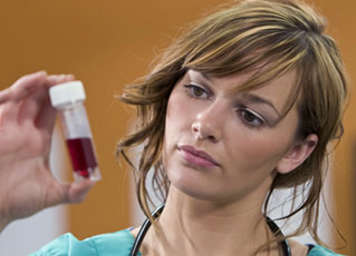
Checking your blood
If you are on tacrolimus, mycophenolate, sirolimus or cyclosporine, the transplant team will check how much immunosuppressant is in your blood from time to time.
The team will measure the immunosuppressant levels in your blood before you take your morning dose. On days that your blood level is being checked:
- Do not take your morning dose of immunosuppressant; instead bring it with you and take it after the blood work.
- Arrive for blood work as close to your morning dose time as possible so that the team can get an accurate reading.
These blood tests check that the immunosuppressant is working and that the levels of medication in your blood are not too high. The transplant team will also check your blood for certain viruses because you are at greater risk of getting an infection.
Post-transplant lymphoproliferative disorder
Because your immune system is weaker, there is a small chance of developing a condition called post-transplant lymphoproliferative disorder (PTLD). This condition causes the cells in your lymph glands (lymphocytes) to divide much faster than they normally would. This abnormal cell growth can occur in different areas of the body. Generally, PTLD can be treated if it is caught early. In rare cases, however, PTLD can lead to a type of cancer called lymphoma.
The transplant team will give you regular check-ups to look for any enlarged lymph glands (lumps) in your neck, armpits or groin. Make sure you tell the team about any strange symptoms such as blood in your stool (poo), unexplained weight loss or any continuing feelings of nausea.
Keep track of your blood work and clinic visit dates and make sure these important tests get done. This will give the transplant team the best chance to help you stay healthy after your transplant.
Other important tips
- Keep an up-to-date list of all of your medications in your wallet or purse so that you can show it to doctors, nurses and pharmacists when needed.
- Make sure that your family doctor and dentist know that you are taking immunosuppressants before you have any treatments.
If you are sexually active
- Be aware that some immunosuppressants, such as tacrolimus and cyclosporine, could cause birth defects if they are taken at the time of conception or during pregnancy.
- Be aware that mycophenolate is known to cause birth defects if it is taken at the time of conception or during pregnancy and that birth control should be continued for six weeks after stopping mycophenolate to reduce the risk of any defects.
- Always use a condom, not only to prevent pregnancy but to prevent sexually transmitted infections.
If there comes a time when you want to have a child, you can talk to your transplant team. Changes to your medicines may be possible to ensure a safe pregnancy for you and your partner.






